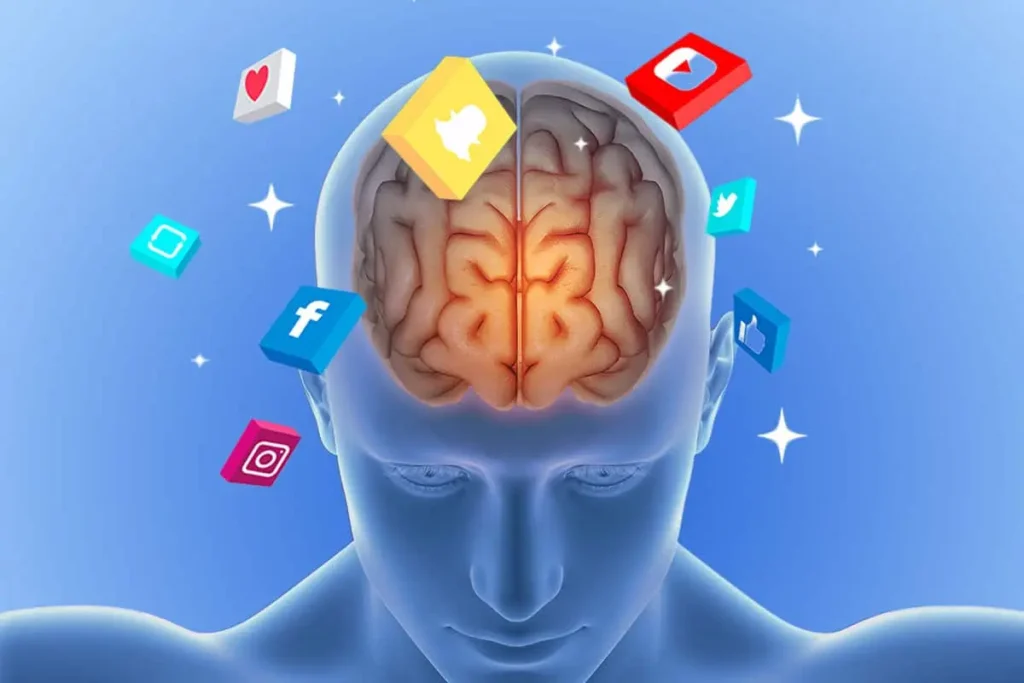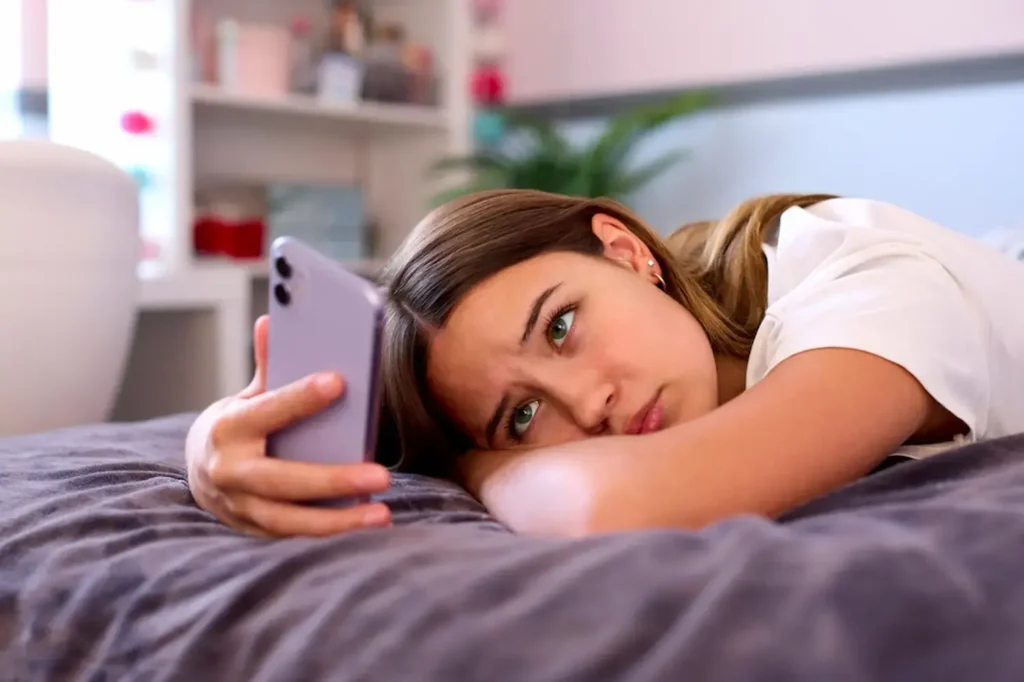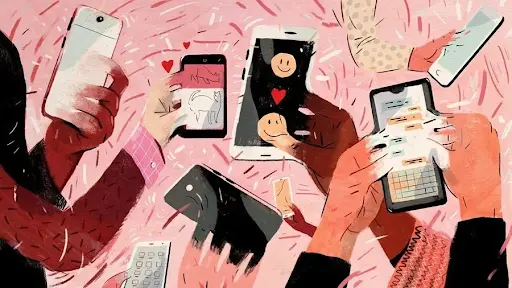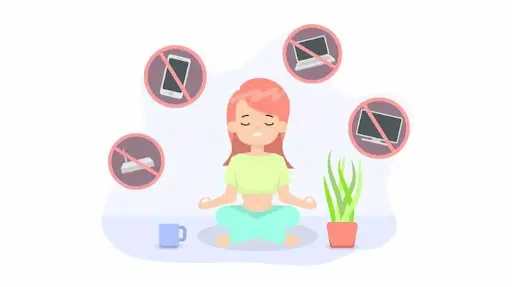Social media addiction has quietly become one of the most common behavioral disorders in today’s fast-paced digital world. It could seem like a nice or harmless thing to do — spending hours scrolling through Instagram or watching YouTube shorts’ fun videos.
But here’s the scary truth: the brain reacts to these kinds of things in ways that are quite similar to how it reacts to drugs or alcohol. Reels are designed for maximal engagement, employing variable reward schedules of constant checking, the mechanisms of traditional behavioural addictions like gambling.The neuroscience of scrolling indicates that watching short-form content effects can modify how the brain works, how it rewards itself, and even how it governs itself.
Do you feel good when you watch reels, like when you drink? If that’s the case and you can imagine it happening, let’s look at the psychological and scientific reasons for this digital or social media addiction and understand how it’s truly affecting your brain chemistry.
The Neuroscience of Scrolling: How Reels Trigger Dopamine and Pleasure Pathways
It’s the same routine for many now. Every night or at resting time, your brain gets ready for something entertaining to swipe to a new reel. It might be a joke, a dance move, a hack, or an ending that no one saw coming.
All of this triggers a dopamine rush, like alcohol, a chemical in the brain that makes you joyful when you think about doing something you want to do. This is the same chemical that makes people happy and want more. If someone is really struggling with alcohol addiction, here are some early intervention measures!
Moreover, dopamine also flows when you drink alcohol, which is why people feel good, relaxed, or high after they drink. So the brain just learns to find the next nice thing in every situation. You think, what is the difference? Reels are good for your brain, but booze is a narcotic. Due to Social media attention span which is like a slow poison killing your brain and affecting your overall health leading to severe consequences.
Behavioural Addiction manifests as an overriding compulsion to watch reels, leading to neglect of real-world responsibilities, face-to-face interactions, as screen times impact the brain However, the same reward mechanism is obstructed by both of them.
This constant stream of dopamine rush, like alcohol addiction, makes you want to keep scrolling for more and more dopamine. Because the brain becomes neutral and less responsive eventually to dopamine, maintaining the same level of excitement requires either longer sessions or more intense content. As a result, people happen to grow their social media addiction because their brains have learnt to enjoy screens more than life.

Why Short-Form Videos Are So Addictive to Your Brain
Short-form content is made to satisfy the brain’s innate desire to learn and be curious.
Through social media, people are kept interested since each scroll is different, and they can enjoy it a little bit, then they move to the next, new one.
Instagram Reels use algorithms that look at how people react and display things that will keep them viewing for as long as possible. Moreover, short-form video effects have a stronger impact than long videos because they feel quick and are tailored to the viewer’s past engagements, like likes, comments, and shares.Increased screen time impacts brain as reels often contributes to social isolation and may negatively impact self-esteem t
It also keeps individuals extra engaged because their brain thinks it’s doing something important since the sounds, colors, and visuals change so quickly. The short-form video content can significantly reduce attention span and the capacity for focused,
But there is a cost to this. Due to Social media attention span the brain gets exhausted when it needs to deal with mood swings, changes in focus, and spikes in dopamine all the time. Additionally, it feels a lot like being addicted to drinking alcohol.

Mental Health Risks of Watching Too Many Reels at Once
At first, it might seem like a pleasant thing to do to watch a lot of video content in a row, but it’s clear that it has an effect on mental health. Psychologists and neuroscientists behind the neuroscience of scrolling now warn that too many short-form video effects can make it harder to control your feelings, stay focused, and feel good.
When people watch short, repeated videos for hours, they lose interest in what they’re doing on social media — it becomes unnecessary at some point. It starts feeling heavy on the chest as it has become more overwhelming and stimulating, because there’s no end.
Eventually, as you have fallen for social media addiction, you will find it hard to focus on long-form videos or content like novels or even conversations. Researchers call this phenomenon “TikTok brain changes.” Because the brain is continuously seeking fresh stimuli to fuel it as social media has changed the brain’s reward system. Moreover, after some time, this makes tedious or repetitive tasks feel awful.
Anxiety, irritability, lack of drive, and explosive anger are symptoms that may emerge as a result of a severe social media addiction. The brain’s conditioned response to instant gratification makes it difficult to appreciate real-life experiences that usually take more time to bring joy.

Get Rid of Reels Addiction and Reclaim Your Mind with 10 Easy Steps
People all over the world are learning that spending too much time in front of screens might impair their brains, and a lot of them are scared that they will get hooked on technology. For further inspiration, here are a few more stories of people’s journeys out of addiction.
If you’re worried that social media could have an addictive effect on your mental health, these 10 practical tactics can assist you in regaining control.Then immediately you should reduce the screen time because as the human body mental space is wired stopping everything immediately is impossible if you are addicted so it’s always better to start with less to make the impact better therefore .Social media attention span should be decrease to reduce to witness long term health benefits.
1. Establish Daily App Use Limits
You can usually limit how much time you may spend on applications like Instagram and YouTube on most devices. You should aim to cut out 15 to 30 minutes of reel-watching time every week to start. Quitting suddenly isn’t as sustainable as cutting back gradually.
2. Disable Notifications
The goal of every ping is to give you a dopamine rush like alcohol. So put an end to unnecessary notifications by turning them off.
3. Set Aside Time When You Won’t Use Screens
Set aside some times of the day as “screen-free zones.” For instance, you may do this during meals, an hour before bed, or while working out. This also helps people pay more attention to and focus on life beyond social media.
4. Do Things That Aren’t On Reels Instead
Engage in hobbies, reading, writing, or physical exercise. These things naturally enhance your brain’s dopamine levels without overstimulating it. In practice, it’s like a digital dopamine detox.
5. Use Analytics Tools To Keep Track Of How You Use It
You can see how much time you spend on your phone by using built-in screen time trackers or third-party apps. The first step in stopping the loop of social media behavioral addiction is to be aware of it. Here is a more in-depth context on types of behavioral addictions and ways to tackle them!
6. Be Mindful When You Scroll
Doomscrolling is the biggest villain of all. Pay attention to how some things make you feel, such as being nervous, happy, or restless. Being aware of how you feel can help you stop mindlessly binge-watching. Mindfulness also helps with social media-influenced brain changes by slowing down the neuronal reward loops.
7. Set Challenges Without Reels
Try to stay away from reels for a day or a weekend. Your brain learns to like slower, more meaningful activities as you gradually add more time without reels.
8. Stop Following Accounts That Make You Unrestful
If some influencers or pages make you scroll for a long time, you can choose to mute or unfollow them. Put quality over quantity in your feed.
9. Tools For Blocking Content
You can use extensions and programs like Freedom, StayFocusd, or Digital Wellbeing to restrict social media apps temporarily. This is a planned technique to accomplish a digital dopamine detox without only using willpower.
10. Think About The Benefits
Write down how using less reel helps you focus, feel better, and sleep better. Seeing real progress makes you want to stay disciplined even more, and you also get an escape from social media addiction.
There are more therapy treatments available for someone looking for outside help!

Recent Lawsuits Highlighting the Dangers of Social Media Addiction
Here are some big court decisions in states like California and New York, about how social media addiction might hurt mental health:
- A new law in California says that social media services must include health warning labels on their sites for people under 18 to tackle addiction, anxiety, and trouble sleeping.
- New York City is suing Meta, Snap, TikTok, and Google for setting kids up to do awful things on social media to gain some money.
Regaining Discipline in an Age of Intense Digital Distractions
Asking, “Does watching reels affect your brain like alcohol?” gets to the heart of modern living. In the same way that alcohol and social media create a revolving door of want and repetition, dopamine does the same. One is pharmacological and the other is psychological, but they both modify the brain’s reward system in ways that are surprisingly similar — and are bad.
When we know how this addiction relationship works, we can reach our goals. Everyone can stop scrolling and achieve digital dopamine detox for good if we learn how to spot the indications of social media addiction, take a break from digital dopamine, and put real-life experiences first.
It’s not about giving up social media; it’s about making sure your mind is in charge, not your feed. To get over the digital high, you need to know what you’re doing, find a balance, and use technology for a better purpose.






